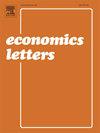Non-diversified portfolios with subjective expected utility
IF 2.1
4区 经济学
Q2 ECONOMICS
引用次数: 0
Abstract
Diversification is the typical investment strategy of risk-averse agents. However, non-diversified positions that allocate all resources to a single asset, state of the world or revenue stream are common too. We show that whenever finitely many non-diversified demands under uncertainty are compatible with risk-averse subjective expected utility maximization under strictly positive beliefs, they are also rationalizable under the same beliefs by many qualitatively distinct risk-averse as well as risk-neutral and risk-seeking preferences.
具有主观预期效用的非分散投资组合
分散投资是风险规避者的典型投资策略。然而,将所有资源分配给单一资产、世界状况或收入流的非分散化头寸也很常见。我们的研究表明,只要在不确定性条件下有有限多的非分散化需求符合严格正向信念下的风险规避主观预期效用最大化,那么在相同的信念下,这些需求也可以被许多定性不同的风险规避、风险中性和风险追求偏好所合理化。
本文章由计算机程序翻译,如有差异,请以英文原文为准。
求助全文
约1分钟内获得全文
求助全文
来源期刊

Economics Letters
ECONOMICS-
CiteScore
3.20
自引率
5.00%
发文量
348
审稿时长
30 days
期刊介绍:
Many economists today are concerned by the proliferation of journals and the concomitant labyrinth of research to be conquered in order to reach the specific information they require. To combat this tendency, Economics Letters has been conceived and designed outside the realm of the traditional economics journal. As a Letters Journal, it consists of concise communications (letters) that provide a means of rapid and efficient dissemination of new results, models and methods in all fields of economic research.
 求助内容:
求助内容: 应助结果提醒方式:
应助结果提醒方式:


